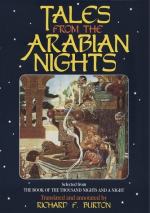[FN#145] Arab. “Bulad” from the Pers. “Pulad.” Hence the name of the famous Druze family “Jumblat,” a corruption of “Jan-pulad"=Life o’ Steel.
[FN#146] Pharaoh, so called in Koran (xxxviii. 11) because he tortured men by fastening them to four stakes driven into the ground. Sale translates “the contriver of the stakes” and adds, “Some understand the word figuratively, of the firm establishment of Pharaoh’s kingdom, because the Arabs fix their tents with stakes; but they may possibly intend that prince’s obstinacy and hardness of heart.” I may note that in “Tasawwuf,” or Moslem Gnosticism, Pharaoh represents, like Prometheus and Job, the typical creature who upholds his own dignity and rights in presence and despight of the Creator. Sahib the Sufi declares that the secret of man’s soul (i.e. its emanation) was first revealed when Pharaoh declared himself god; and Al-Ghazali sees in his claim the most noble aspiration to the divine, innate in the human spirit. (Dabistan, vol. iii.)
[FN#147] In the Calc. Edit. “Tarmuz, son of the daughter,” etc. According to the Arabs Tadmur (Palmyra) was built by Queen Tadmurah, daughter of Hassan bin Uzaynah.
[FN#148] It is only by some such drought that I can account for the survival of those marvellous Haurani cities in the great valley S. E. of Damascus.
[FN#149] So Moses described his own death and burial.
[FN#150] A man’s “aurat” (shame) extends from the navel (included) to his knees, a woman’s from the top of the head to the tips of her toes. I have before noticed the Hindostani application of the word.
[FN#151] Arab. “Jum’ah” ( = the assembly) so called because the General Resurrection will take place on that day and it witnessed the creation of Adam. Both these reasons are evidently after-thoughts; as the Jews received a divine order to keep Saturday, and the Christians, at their own sweet will, transferred the weekly rest-day to Sunday, wherefore the Moslem preferred Friday. Sabbatarianism, however, is unknown to Al-Islam and business is interrupted, by Koranic order ([xii. 9-10), only during congregational prayers in the Mosque. The most a Mohammedan does is not to work or travel till after public service. But the Moslem hardly wants a “day of rest;” whereas a Christian, especially in the desperately dull routine of daily life and toil, without a gleam of light to break the darkness of his civilised and most unhappy existence, disctinctly requires it.
[FN#152] Mankind, which sees itself everywhere and in everything, must create its own analogues in all the elements, air (Sylphs), fire (Jinns), water (Mermen and Mermaids) and earth (Kobolds), These merwomen were of course seals or manatees, as the wild women of Hanno were gorillas.




